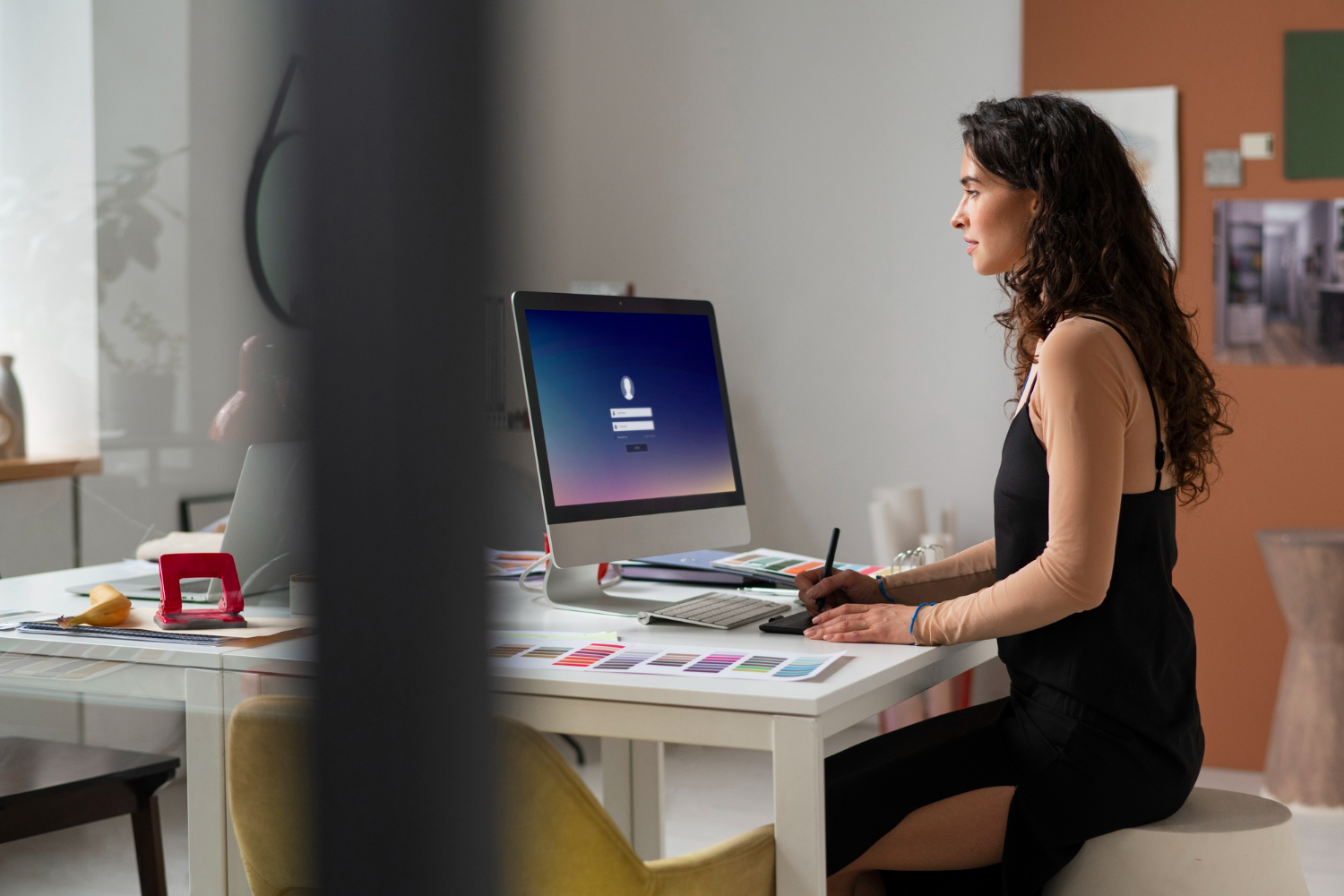A professionally designed website is often the cornerstone of any successful online business or project. Whether you're launching a new venture or upgrading your current website, finding the right web design company is key. The perfect team can create a user-friendly and visually appealing website tailored to your needs, but the wrong choice can cost you time, money, and, most importantly, clients.
Selecting a good website designer requires more than just browsing portfolios. You need to make sure the designer or agency aligns with your business goals, offers the right services, and communicates effectively throughout the design process.

How to Choose a Web Design Company
When looking for a web designer, the sheer number of options can be overwhelming. From freelancers to established agencies, each has its pros and cons. The key is to focus on finding a creative website designer who can meet your requirements and guarantee seamless collaboration.
Define Your Website Goals and Budget
Before starting your search, clarify what you want your website to achieve. Is it to drive sales, provide information, or showcase a portfolio? These goals will shape the design and functionality needed. Similarly, establish a clear budget. While hiring a professional website designer can be a significant investment, understanding your financial boundaries will help you choose the right provider without unnecessary compromises.
Research and Evaluate Portfolios
When assessing potential designers, review their past projects. Pay attention to how they handle different industries and whether their style aligns with your vision and how you would like your potential clients to see your business. A good website designer will have a diverse portfolio that demonstrates creativity, technical expertise, and adaptability.
Look for Reviews and Recommendations
Word of mouth and client testimonials are invaluable. Ask colleagues or peers if they’ve worked with a specific agency, or check reviews online because their portfolio can’t tell you how it will be to work with them. A reputable web designer & branding specialist will often have a proven track record backed by positive client experiences.
Understand the Designer’s Process
Not all designers work the same way. Ask about their approach to projects, timelines, and the level of client involvement. More about what to ask before starting cooperation, you will find below. A clear and structured process indicates professionalism and guarantees smoother collaboration.
Prioritize Communication and Support
A good website designer will prioritize open communication. During your initial consultations, take note of their responsiveness and willingness to answer your questions. Post-launch support is equally important, as you may need assistance with updates or troubleshooting after the project is complete.
Consider Technical Skills and Specializations
In addition to artistic ability, web design requires technical expertise. Make sure the designer team has a strong grasp of coding languages, UX/UI principles, and responsive design. To guarantee that your website ranks highly in search results, they also need to be knowledgeable about SEO best practices or have an SEO specialist on their team.

Questions to Ask a Web Designer
When you need a website designer, asking the right questions is crucial. This guarantees that the designer or agency you choose can deliver the results you expect while providing insight into their expertise and approach. Here are essential questions to ask during the selection process.
1. What Is Your Design Process?
When looking for a website design company, ask about their workflow. A solid process includes research, wireframing, designing, developing, and testing. Every step guarantees that your objectives are fulfilled, and changes make sure the finished result reflects your vision. Knowing their approach helps gauge their organization and ability to meet deadlines. A professional website designer with a clear process minimizes misunderstandings, promoting smooth collaboration and a result tailored to your brand and audience.
2. Can You Show Me Examples of Similar Projects?
Ask the designer to show it—website designer samples that align with your needs. A strong portfolio demonstrates experience in different industries, creativity, and attention to detail. Look for responsive designs, intuitive navigation, and branding consistency. Reviewing examples helps you assess their ability to handle your project’s unique challenges. A skilled website designer should explain how past projects succeeded, giving you confidence in their skills to deliver a functional and visually appealing website.
3. Which of the Following Is an Important Requirement for All Web Designers?
Every professional website designer needs skills in design principles, user experience, and responsive layouts. They must prioritize SEO, accessibility, and fast-loading pages. Ask how they integrate modern trends and guarantee long-term functionality. A designer’s ability to balance usability, aesthetics, and performance is essential for success. Their expertise in these areas reflects their readiness to create a high-quality website that aligns with your business goals and improves the user experience.
4. What Platforms and Technologies Do You Use?
Understanding the designer’s tools is key when you need a website designer. Popular platforms include WordPress, Shopify, or custom CMS options, depending on your goals. Ask if their technology supports scalability, site speed, and ease of maintenance. A website designer should also know coding languages like HTML and JavaScript. By clarifying their tech stack, you can be sure that the chosen tools align with your vision and enable smooth functionality.
5. How Do You Handle Revisions?
Revisions are part of working with a good website designer. Ask how many rounds are included and what their process is for incorporating feedback. Designers should encourage open communication and provide clear timelines for changes. Discuss additional costs for extra revisions to avoid surprises. Flexibility in refining the project guarantees you receive a website that meets your vision and business needs. A structured revision process reflects professionalism and a commitment to client satisfaction.
6. Do You Provide Ongoing Maintenance and Support?
If you’re looking for a website design company, post-launch support is vital. Websites need updates, backups, and troubleshooting to stay functional. Ask about their maintenance plans and response times for urgent fixes. Some offer ongoing services, while others provide training for in-house management. Reliable support guarantees your website stays secure and optimized, helping your online presence remain strong. Maintenance services demonstrate a commitment to long-term client relationships and successful performance.
7. How Do You Approach Branding?
A web designer & branding specialist integrates your brand’s identity into every element of the website. Ask how they plan to use your logo, colors, and imagery to create a cohesive design that resonates with your audience. Consistency in tone and visuals is key for a strong online presence. Their ability to align design with branding reflects their expertise in crafting websites that aren’t just functional but also impactful in building trust and recognition.
8. What Is Your Timeline for Delivering Projects?
Timelines are critical when hiring a web designer. Ask for a detailed breakdown of each phase and whether they can meet specific deadlines. Reliable designers set realistic timeframes and communicate delays early. You can time your marketing efforts around the launch of your website if you are aware of their schedule. By providing updates, guaranteeing timely delivery without sacrificing quality, and adjusting their schedule to fit your company's demands, an experienced website designer keeps the project on track.
9. How Will You Optimize My Website for SEO?
SEO guarantees your site ranks well and attracts visitors. Ask how the designer optimizes elements like site speed, mobile compatibility, and meta tags. A resourceful website designer focuses on creating an SEO-friendly structure and improving usability for search engines and users. Discuss tools they use to monitor performance post-launch. Including SEO techniques in the design stage guarantees that your website supports your long-term business objectives and creates a solid basis for future expansion.

10. Do You Have Experience in My Industry?
Industry experience can be valuable when looking for a web designer. Familiarity with your niche allows them to create features and designs that resonate with your audience. Ask for examples of similar projects to assess their ability to meet your needs. While not mandatory, experience in your sector shows the designer understands your goals, making collaboration smoother. A professional web designer can swiftly adjust to industry norms, guaranteeing a customized solution for your company.
11. Will My Website Be Mobile-Friendly?
Ask the designer about their approach to mobile optimization. A responsive website is crucial since many users access sites from mobile devices. A competent website designer makes sure that the layout and functionality remain consistent across screen sizes. Check their portfolio for examples of mobile-friendly websites. Mobile optimization not only improves user experience but also boosts SEO rankings, making it an essential aspect of the design process for modern websites.
12. How Will You Guarantee My Website Is Secure?
Security is a top priority for any website. Ask how the designer handles security measures such as SSL certificates, regular updates, and secure hosting. A professional website designer should be familiar with best practices for protecting user data and preventing cyberattacks. Inquire about their process for keeping the site secure post-launch. Maintaining visitor trust and preventing future expensive security breaches are two benefits of making sure your website is secure from vulnerabilities.
13. Will You Provide Training on How to Manage My Website?
If you plan to manage content updates on your own, ask if the designer offers training. A good website designer should be willing to guide you through using the website’s backend or content management system (CMS). They should provide easy-to-follow instructions on updating content, adding pages, and handling basic maintenance. Proper training guarantees seamless operations long after the site is published and gives you the ability to operate your site on your own.
14. Do You Offer Search Engine Optimization (SEO) Services?
Inquire about SEO services and how the designer plans to optimize your site for better visibility. A website designer should incorporate SEO best practices, such as optimizing page load times, using proper HTML tags, and guaranteeing mobile-friendliness. Some designers offer SEO packages or work with specialists. Discuss their keyword integration and on-page and off-page SEO strategies to make sure your website gets organic traffic and ranks highly in search results.
15. How Will You Guarantee My Website Is User-Friendly?
User experience (UX) is vital for retaining visitors. Ask how the designer plans to improve the website's navigation, layout, and accessibility. The ability to create clear calls to action and an understandable layout are hallmarks of a good website designer. They should also focus on site speed, mobile-friendliness, and content structure. A user-friendly site helps reduce bounce rates and improves overall user satisfaction, driving better results for your business.
16. Do You Offer E-Commerce Web Design Services?
If you need an online store, ask the designer if they specialize in e-commerce website design. A professional website designer experienced in e-commerce will understand the complexities of shopping carts, payment gateways, and product pages. They should also focus on creating a smooth user experience with easy navigation, secure payment options, and mobile optimization. To make sure they can fulfill your particular needs, ask about their experience with systems such as Magento, WooCommerce, or Shopify.
17. What Are Your Pricing Models?
Understanding the designer’s pricing model is important for setting expectations. Ask if they charge hourly rates, project-based fees, or offer retainer services. A creative website designer will provide a detailed breakdown of costs for design, development, and any additional services like SEO or content creation. Clarify if there are any ongoing costs, such as hosting or maintenance. A clear price structure helps in budget management and allows you to steer clear of unforeseen costs when working on a project.
18. Do You Provide Content Creation Services?
Websites need compelling content, so ask if the designer offers content creation or if they work with copywriters. A website designer should understand how to present your brand’s message effectively. Good content can improve user engagement and SEO. If the designer doesn’t provide content services, inquire if they have recommendations for trusted content creators. Well-written content is essential for a successful website, and the designer should be able to guide you in creating it.
19. How Do You Measure the Success of a Website?
Ask the designer how they define success for a website. A professional website designer will consider metrics such as user engagement, conversion rates, and traffic growth. They may also use tools like Google Analytics to monitor the site’s performance post-launch. Discuss how they track KPIs (Key Performance Indicators) and how they adjust strategies if necessary. When working on a project, having a defined price structure helps you manage your budget and avoid unanticipated expenses.
20. Will You Help with Website Launch and Marketing?
Website launches require careful planning. Ask if the designer assists with launch preparations, such as testing, bug fixes, and guaranteeing everything functions properly. Some designers also help with marketing strategies, including email campaigns, SEO, and social media promotion. A web designer & branding specialist may offer additional services to help your site reach the right audience. Talk about how they will help you during the launch phase to make sure that the transition from development to going live goes smoothly.

Great Web Design
A great web design is more than just an attractive layout—it’s a combination of functionality, usability, and aesthetics that aligns with your brand and engages your audience. When hiring a web designer, it's essential to understand what sets a great website apart and how to know your chosen designer can deliver these qualities.
What Defines Great Web Design?
Great design combines visual appeal with practical functionality. It must cater to the needs of both the user and the business. A website designed by a reliable designer often includes:
- Responsive Design: Optimized for mobile, tablet, and desktop screens.
- Fast Loading Speeds: Guarantees visitors don’t leave due to slow performance.
- User-Friendly Navigation: Helps users find information effortlessly.
- Consistent Branding: Aligns with your logo, colors, and overall identity.
- Clear Call-to-Action (CTA): Guides users to take specific actions like making a purchase or signing up.
If, after reading this list, you’re certain that you don’t want to learn how to be a website designer, choosing the right one should be your top priority.
Why Hiring a Web Designer Matters
While DIY website builders may seem cost-effective, they often lack the customization and expertise needed to create a polished site. Hiring a web designer guarantees you get:
- Tailored Solutions: A custom design that fits your business needs.
- Technical Expertise: Advanced coding and integration of tools or platforms.
- SEO Optimization: A site that ranks well on search engines.
- Professional Aesthetic: Designs that stand out and attract users.
What to Expect When Website Design Is Needed
When starting a project with a web design company, expect a collaborative approach. A professional team will:
- Conduct a discovery phase to understand your goals.
- Develop wireframes and prototypes to showcase ideas.
- Offer regular updates and revisions based on your feedback.
The result is a website that meets both your technical and branding needs.
Signs of a Great Web Designer
If you're looking for a website design company, keep an eye out for these qualities:
- Experience and Versatility: A diverse portfolio across industries.
- Strong Communication Skills: Keeps you informed throughout the process.
- Innovative Thinking: Offers creative solutions for challenges.
- Post-Launch Support: Available for maintenance and updates after the site goes live.
The best websites seamlessly combine form and function. They look great while serving a clear purpose, such as generating leads, selling products, or building brand awareness. A web designer knows how to balance these elements for optimal performance.
Back to the top
